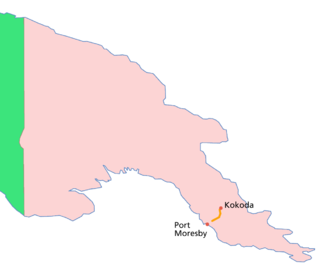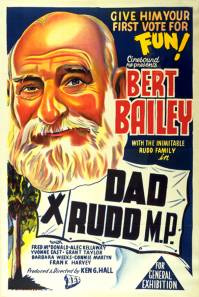The Academy Award for Best Documentary Feature Film is an award for documentary films. In 1941, the first awards for feature-length documentaries were bestowed as Special Awards to Kukan and Target for Tonight. They have since been bestowed competitively each year, with the exception of 1946. Copies of every winning film are held by the Academy Film Archive.

The Kokoda Track or Trail is a single-file foot thoroughfare that runs 96 kilometres (60 mi) overland – 60 kilometres (37 mi) in a straight line – through the Owen Stanley Range in Papua New Guinea (PNG). The track was the location of the 1942 World War II battle between Japanese and Allied – primarily Australian – forces in what was then the Australian territory of Papua.

Kenneth George Hall was an Australian film producer and director, considered one of the most important figures in the history of the Australian film industry. He was the first Australian to win an Academy Award.

Charles Edward Chauvel OBE was an Australian filmmaker, producer and screenwriter and nephew of Australian army General Sir Harry Chauvel. He is noted for writing and directing the films Forty Thousand Horsemen in 1940 and Jedda in 1955. His wife, Elsa Chauvel, was a frequent collaborator on his filmmaking projects.

David Parer ACS is an Australian natural history film maker, working in partnership with his wife and sound recordist, Elizabeth Parer-Cook.

Cinesound Productions Pty Ltd was an Australian feature film production company, established in June 1931, Cinesound developed out of a group of companies centred on Greater Union Theatres, that covered all facets of the film process, from production, to distribution and exhibition.

Damien Peter Parer was an Australian war photographer. He became famous for his war photography of the Second World War, and was killed by Japanese machine-gun fire at Peleliu, Palau. He was cinematographer for Australia's first Oscar-winning film, Kokoda Front Line!, an edition of the weekly newsreel, Cinesound Review, which was produced by Ken G. Hall.

A Steam Train Passes is a 1974 Australian short film set in the 1940s, featuring the construction and operation of C38 class locomotive 3801.

Dad Rudd, M.P. is a 1940 comedy that was the last of four films made by Ken G. Hall starring Bert Bailey as Dad Rudd. It was the last feature film directed by Hall prior to the war and the last made by Cinesound Productions, Bert Bailey and Frank Harvey.
100,000 Cobbers is a 1942 dramatised documentary made by director Ken G. Hall for the Australian Department of Information during World War II to boost recruitment into the armed forces. Grant Taylor, Joe Valli and Shirley Ann Richards play fictitious characters.
South West Pacific is a 1943 propaganda short Australian film directed by Ken G. Hall which focuses on Australia as the main Allied base in the South West Pacific area. Actors depict a cross section of Australians involved in the war effort.
An Australian Government Film is an Australian film that has been funded by the Australian government at either a state or federal level. This type of film is distinct from an Australian independent film which has had no up-front government investment.

The Shadowcatchers: A history of cinematography in Australia is a photographic history of Australian cinematography, written by Martha Ansara and published by the Australian Cinematographers Society, which launched the project for its 50th Anniversary in 2008.

Winnie the War Winner was a radio set built by Sparrow Force during the Battle of Timor in 1942. The radio re-established contact between Sparrow Force and the Australian Army in Darwin on 19 April 1942. At the time, the Allies believed that Sparrow Force had been captured by the Japanese Army. By then, Sparrow Force had fought a guerrilla campaign isolated from Australia for 60 days.
Assault on Salamaua is a 1943 Australian documentary film, produced by Cinesound Productions, about the Salamaua–Lae campaign during World War II.
R.A.A.F. Eagles Over New Guinea is a 1943 Australian newsreel from Cinesound Productions focusing on the role of the Royal Australian Air Force during the New Guinea Campaign in World War II. It includes combat footage taken by Damien Parer.
The Road to Kokoda is a 1942 Australian documentary. Much of the footage shot by Australian war photographer Damien Parer (1912–1944) also appears in Kokoda Front Line!.
The Legend of Damien Parer is a 1964 Australian documentary film on war photographer Damien Parer. It included footage he had filmed and interviews of those who knew him. It was first broadcast on ABC TV on Anzac day when it was met with critical acclaim. The film won the 1964 Australian Film Institute award for Best Documentary.










